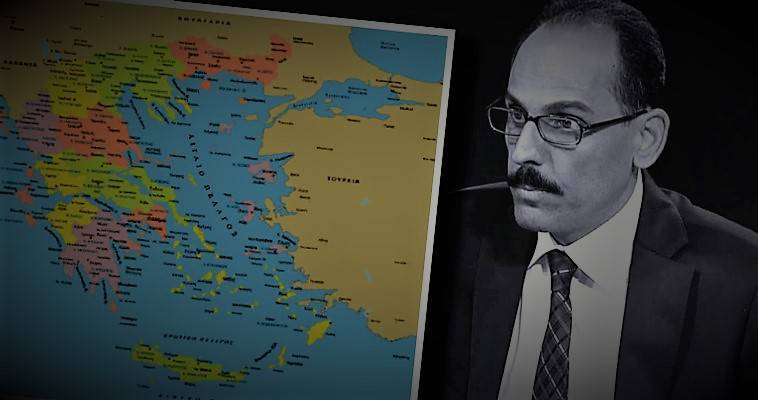Antonia Dimou: Turkey is setting a trap for full-out negotiations
31/07/2020
The statement of the representative of the Turkish Presidency Ibrahim Kalin on the suspension of the seismographic surveys by Oruc Reis, in order to start a constructive approach between Greece and Turkey, is considered to be part of the Turkish strategy of calming the western countries with a temporary withdrawal of Turkish naval forces.
Turkey’s appeasement of the West is thought to have been exacerbated by backstage reactions to the recent double Turkish provocation: first, by turning Hagia Sophia into a mosque and second, by the Turkish naval presence in the sea around Kastellorizo.
The Turkish official’s statement is also part of the oriental haggling against Greece, which aims to promote a pax turkana project in the Aegean and Eastern Mediterranean that promotes Turkish revisionism. The plan focuses on Turkish dominance in Greek sea areas stretching as far south as Crete and aims to raise a domino of claims on the bilateral level, such as territorial waters, airspace and control of sea routes.
As is well known, Ankara has consistently sought to delimit the continental shelf in the Aegean (which is the only difference Greece recognizes) on the basis of bilateral negotiations and outside the rules of international law, arguing that the islands do not have a continental shelf. With the disappearance of the continental shelf-EEZ of Kastellorizo, Turkey seeks on the one hand to separate the contact zone of the EEZs of Greece and Cyprus, on the other hand to raise Turkish claims on the sea plots 1, 4, 5, 6 and 7 located within the EEZ of Cyprus.
A canvas of disputes
In any case, Turkey has been creating a canvas of disputes and claims to the detriment of Greece’s sovereign rights. The grid of Turkish claims is composed of:
- Systematic instrumentalization of refugees and immigrants in order to blackmail Greece and Europe,
- Violations of the Greek national airspace,
- Overflights of Greek territory in Evros and the Aegean islands, frequently with armed military aircraft,
- Non-harmless transits in Greek territorial waters,
- The illegal Memorandum with the government of Tripoli in Libya for the demarcation of the sea zones, which ignores the right of Crete to the continental shelf and the EEZ.
These claims and the questioning of the status of the Greek islands of the Eastern Aegean are an integral part of Turkish revisionism which focuses on the questioning of the 1923 Treaty of Lausanne which defined the borders of modern Turkey. Given that, as provided by the Law of Treaties, the treaties defining borders are not revised, Turkey seeks the de facto challenge to the Treaty of Lausanne both by consolidating its military presence in war theaters stretching from Syria to Libya as well as by forging new alliances in the context of a changing regional environment.
Given these circumstances, Greece must be particularly careful about Turkish intentions that focus on legitimizing all of the neighboring country’s unilateral expansionist claims through bilateral negotiations. Ankara’s goal is to acquire as many Turkish benefits as possible from the potential transfer of Greek sovereign rights in the context of direct Greek-Turkish negotiations.
The fox of the east
The Turkish leadership, acting like a fox of the East, has set the trap of revisionism, which Athens must avoid by moving in two directions, diplomatically and the militarily. Diplomatically, Greece wants to maintain communication channels, proposing the resumption of exploratory contacts, which were suspended in March 2016. Investigative contacts should in no case be under threat or carried out by Turkey and should focus on the demarcation of the continental shelf, excluding any discussion of the well-known Turkish unilateral claims.
In parallel, Greece must exercise public diplomacy in a way that will highlight, abroad, the Greek positions on the issue of the continental shelf and its borders. Public diplomacy is a convenient tool for disseminating Greek positions based on the provisions of the conventional and customary law of the sea against Turkish revisionism, which opposes regional stability and security.
On the basis of International Maritime Law (UNCLOS), Athens must methodically continue negotiations with Cairo on the delimitation of the Greek-Egyptian EEZ, as well as talks with the internationally recognized Libyan House of Representatives on the delimitation of the EEZ. Libya. In fact, any agreement between Athens and the Libyan parliament will enjoy international legitimacy in the face of the Turkish-Libyan memorandum on the delimitation of maritime zones, which is also outside international law and formally invalid.
Greek lobby
It is invalid because it has been negotiated with the Government of National Accord, whose legal term has expired years ago. In addition, the prime minister and his ministers have not been approved by the Libyan parliament, as provided for in the provisions of the Libyan Political Agreement, on the basis of which the Sarraj government was formed.
In addition, Athens must use Greek expatriate organizations in Washington to promote Greek positions in line with US security interests in the Eastern Mediterranean. The constant briefing of US lawmakers and senators, as well as officials in the White House and the US National Security Council, is crucial to the comprehensive presentation of Turkish revisionism to the US President.
Despite his admittedly very good personal relationship with his Turkish counterpart, Trump signed and officially made the East Med Act, the Law on the Security and Energy Partnership in the Eastern Mediterranean, US law. This law recognizes in the most official way that Greece is a strategic partner, and not a country of turmoil or a source of problems in the critical region of the Eastern Mediterranean, as opposed to neighboring countries (indicating Turkey), which commit systematic violations in the Aegean and the Cypriot EEZ.
Military readiness
Militarily, the readiness of the Greek Armed Forces to defend national integrity by land, sea and air, if and when required, is a crucial parameter for curbing Turkish aggression, which is qualitatively upgrading Turkish revisionism towards Greece.
Creating a regional counterweight to the dangerous Turkish revisionism with the participation of Greece and countries with a common orientation such as Egypt, Israel, Jordan, the Emirates, Bahrain and Saudi Arabia is important for consolidating stability and security.
The timeless message of Thucydides according to which “the strong goes as far as his power allows …” finds full application in Greece’s relations with Turkey. Greece is a strong country that has international law on its side, critical allies by its side, and its own power to do whatever it takes to defend its sovereign interests.





